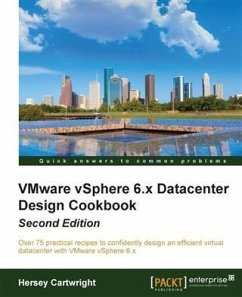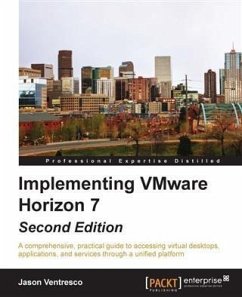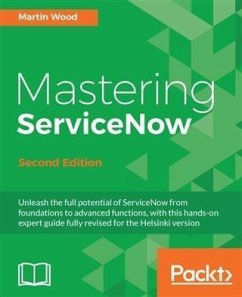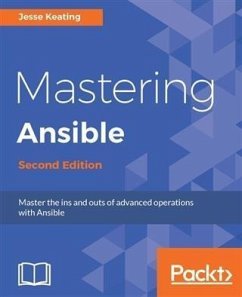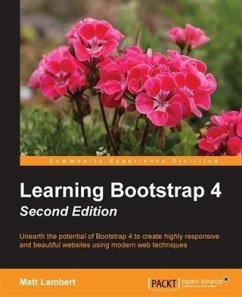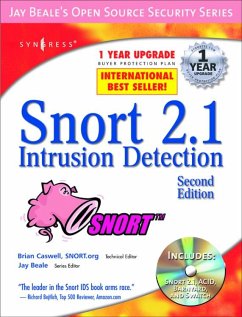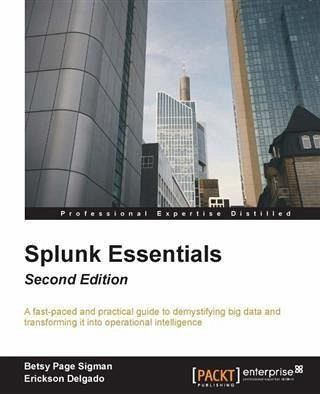
Splunk Essentials - Second Edition (eBook, PDF)
Versandkostenfrei!
Sofort per Download lieferbar
27,95 €
inkl. MwSt.
Weitere Ausgaben:

PAYBACK Punkte
14 °P sammeln!
A fast-paced and practical guide to demystifying big data and transforming it into operational intelligence About This Book Want to get started with Splunk to analyze and visualize machine data? Open this book and step into the world of Splunk. Leverage the exceptional analysis and visualization capabilities to make informed decisions for your business This easy-to-follow, practical book can be used by anyone, even if you have never managed any data before Who This Book Is ForThis book will be perfect for you if you are a Software engineer or developer or System administrators or Business an...
A fast-paced and practical guide to demystifying big data and transforming it into operational intelligence
About This Book
This book will be perfect for you if you are a Software engineer or developer or System administrators or Business analyst who seek to correlate machine data with business metrics and provide intuitive real-time and statistical visualizations. Some knowledge or experience of previous versions of Splunk will be helpful but not essential.
What You Will Learn
Splunk is a search, analysis, and reporting platform for machine data, which has a high adoption on the market. More and more organizations want to adopt Splunk to use their data to make informed decisions.
This book is for anyone who wants to manage data with Splunk. You'll start with very basics of Splunk- installing Splunk-and then move on to searching machine data with Splunk. You will gather data from different sources, isolate them by indexes, classify them into source types, and tag them with the essential fields. After this, you will learn to create various reports, XML forms, and alerts. You will then continue using the Pivot Model to transform the data models into visualization. You will also explore visualization with D3 in Splunk. Finally you'll be provided with some real-world best practices in using Splunk.
Style and approach
This fast-paced, example-rich guide will help you analyze and visualize machine data with Splunk through simple, practical instructions.
About This Book
- Want to get started with Splunk to analyze and visualize machine data? Open this book and step into the world of Splunk.
- Leverage the exceptional analysis and visualization capabilities to make informed decisions for your business
- This easy-to-follow, practical book can be used by anyone, even if you have never managed any data before
This book will be perfect for you if you are a Software engineer or developer or System administrators or Business analyst who seek to correlate machine data with business metrics and provide intuitive real-time and statistical visualizations. Some knowledge or experience of previous versions of Splunk will be helpful but not essential.
What You Will Learn
- Install and configure Splunk
- Gather data from different sources, isolate them by indexes, classify them into source types, and tag them with the essential fields
- Be comfortable with the Search Processing Language and get to know the best practices in writing search queries
- Create stunning and powerful dashboards
- Be proactive by implementing alerts and scheduled reports
- Use the Splunk SDK and integrate Splunk data into other applications
- Implement the best practices in using Splunk.
Splunk is a search, analysis, and reporting platform for machine data, which has a high adoption on the market. More and more organizations want to adopt Splunk to use their data to make informed decisions.
This book is for anyone who wants to manage data with Splunk. You'll start with very basics of Splunk- installing Splunk-and then move on to searching machine data with Splunk. You will gather data from different sources, isolate them by indexes, classify them into source types, and tag them with the essential fields. After this, you will learn to create various reports, XML forms, and alerts. You will then continue using the Pivot Model to transform the data models into visualization. You will also explore visualization with D3 in Splunk. Finally you'll be provided with some real-world best practices in using Splunk.
Style and approach
This fast-paced, example-rich guide will help you analyze and visualize machine data with Splunk through simple, practical instructions.
Dieser Download kann aus rechtlichen Gründen nur mit Rechnungsadresse in A, B, BG, CY, CZ, D, DK, EW, E, FIN, F, GR, HR, H, IRL, I, LT, L, LR, M, NL, PL, P, R, S, SLO, SK ausgeliefert werden.




